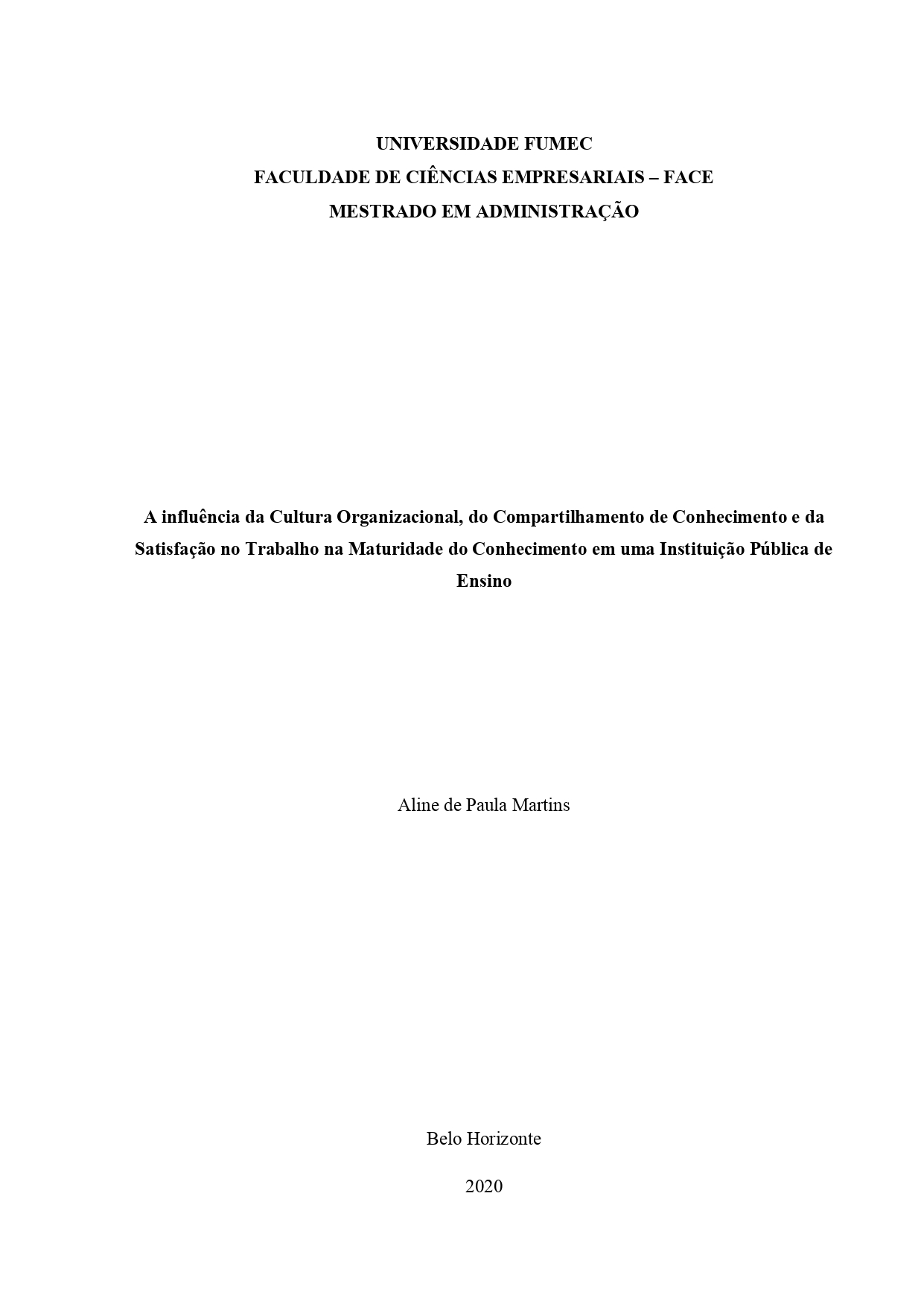A influência da cultura organizacional, do compartilhamento de conhecimento e da satisfação no trabalho na maturidade do conhecimento em uma instituição pública de ensino

Visualizar/
Data
2020Autor
Martins, Alini de Paula
xmlui.mirage2.itemSummaryView.MetaData
Mostrar registro completoResumo
Este estudo foi realizado em todas as unidades do Centro Federal de Educação Tecnológica
(CEFET) em Minas Gerais, abordando os construtos cultura organizacional, compartilhamento
do conhecimento, satisfação no trabalho e maturidade do conhecimento. O objetivo foi analisar
a influência de um construto sob o outro, por meio de uma pesquisa de campo descritiva, de
natureza quantitativa, contando com a aplicação de um questionário aos servidores tanto com o
auxílio da ferramenta SurveyMonkey, quanto impressos, contendo 120 questões que visaram
identificar a cultura organizacional da Instituição, o quanto os servidores compartilham seus
conhecimentos, o nível de satisfação dos mesmos e de maturidade do conhecimento. De uma
população de 1777 docentes e técnicos administrativos ativos no CEFET, foram obtidos 306
questioários válidos. Para análise dos dados, foi utilizada a modelagem de equações estruturais
e os aplicativos AMOS 5.0, SPSS 15, SMARTPLS e LVPLS. Como resultado, foi possível
perceber que os construtos exercem influência uns sob os outros, tendo todas as hipóteses
confirmadas. Portanto, o estudo é importante por diante dos resultados, os gestores terem um
direcionamento para analisar os pontos da cultura organizacional e de compartilhamento de
conhecimento que precisam ser alterados de modo a aumentar a satisfação de seus servidores,
aumentando consequentemente o nível na maturidade de conhecimento da Instituição. O
modelo demonstrou que cada unidade de medida que os gestores conseguirem aumentar na
cultura, aumentará 0,64 o compartilhamento de conhecimento, 0,43 a satisfação no trabalho, e
assim por diante. Ou seja, ele mostra a importância que os gestores precisam dar à cultura
organizacional, pois, por meio de sua percepção por parte dos servidores, pode-se aumentar o
nível do compartilhamento de conhecimento, da satisfação no trabalho e da maturidade do
conhecimento na Instituição. This study was conducted in all units of the Federal Center for Technological Education
(CEFET) in Minas Gerais, addressing the constructs organizational culture, knowledge sharing,
job satisfaction and knowledge maturity. The aim was to analyze the influence of one construct
under another, through a descriptive field research of quantitative nature, with the application
of a questionnaire to the servers with the help of the SurveyMonkey tool, as well as printed,
containing 120 questions that aimed to identify the organizational culture of the institution, how
much the servers share their knowledge, their level of satisfaction and maturity of knowledge.
From a population of 1777 teachers and administrative technicians active in CEFET, 306 valid
questionnaires were obtained. For data analysis, structural equation modeling and AMOS 5.0,
SPSS 15, SMARTPLS and LVPLS applications were used. As a result, it was possible to realize
that the constructs exert influence on each other, having all hypotheses confirmed. Therefore,
the study is important because of the results, managers have a direction to analyze the points of
organizational culture and knowledge sharing that need to be changed in order to increase the
satisfaction of their employees, consequently increasing the level of knowledge maturity. of the
institution. The model demonstrated that each unit of measure that managers can increase in
culture will increase 0.64 knowledge sharing, 0.43 job satisfaction, and so on. That is, it shows
the importance that managers need to give to the organizational culture, because, through their
perception by the servers, the level of knowledge sharing, job satisfaction and knowledge
maturity in the institution can be increased.
